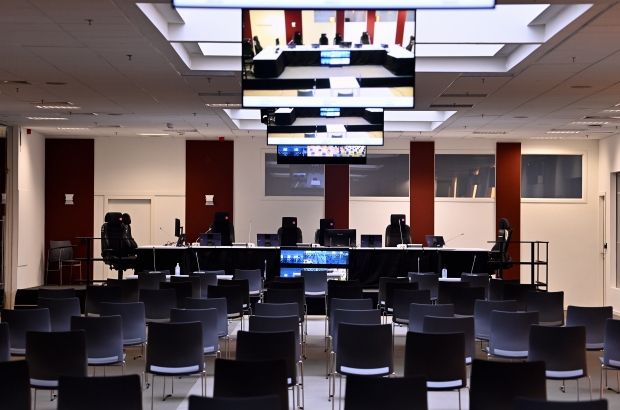- Daily & Weekly newsletters
- Buy & download The Bulletin
- Comment on our articles
No 'glass cages' for suspects in Brussels terror trial, court rules
A court has ruled that the glass boxes intended to house the accused during the Brussels terror attacks trial violate the rights of the defendants and cannot be used in their current state.
The trial formally began last week, and the plan was for the suspects to stand inside the glass boxes during the proceedings, speaking to their lawyers through holes drilled into the box and being handed any relevant documents through a small hatch.
But a Brussels court ruled that using the boxes would make a fair trial impossible, not only because it makes it difficult for the accused to communicate freely with their lawyers but also because it gives the jury an impression that they are already guilty.
The construction of the defendants' boxes cost €250,000, according to the federal prosecutor's office.
While there are 10 accused, only nine boxes were built because one of the suspects is presumed dead.
The defence argued at a preliminary hearing that the "cages" amounted to degrading and inhumane treatment and violated the suspects' rights to a fair trial.
The court agreed about the former, but disputed the accusation that the boxes were inhumane.
"The individual compartments are made of glass, not metal, and the accused have sufficient space," the court said in its statement.
"There is sufficient ventilation and heating. The fact that the accused are seated separately is uncomfortable, and communication with their lawyers is also difficult, but not in such a way as to constitute degrading treatment."
The court described the boxes in detail, saying that the setup resembled one large box comprising nine compartments, four of which were larger than the other five.
“The written communication with the lawyers is done through a small slot, the oral through small holes that are at knee height in front of the accused, or through a telephone,” it was said, but this was not the same for each compartment.
“The accused sitting in the smaller compartments cannot communicate with their lawyers through those holes because they are not sitting right in front of them. There is a phone but those conversations can be heard by the court, the prosecution, and the jury. It is also not clear whether communication through that channel will be possible when a witness is speaking.”
It was also pointed out that it would be difficult for the court and the prosecution to see the accused, and that the suspects would have difficulty hearing and therefore following the proceedings.
The security reasons cited by the federal prosecutor's office in their justification of the boxes was insufficient, the court ruled.
“Police officers are present at all trials,” the court pointed out. “Individual boxes can also pose their own security problems: accused persons can injure themselves, can speak unexpectedly, or can start shouting and banging on the walls, as happened at the previous hearing.”
It is not yet clear whether the dismantling of the boxes will result in any delays or budgetary changes to the trial, or if a new but similar set up will replace the old one.
“The box in its current configuration violates Article 6 of the European Convention on Human Rights,” the judge determined. The order is to “dismantle the box in its current configuration” by 10 October at the latest.

















